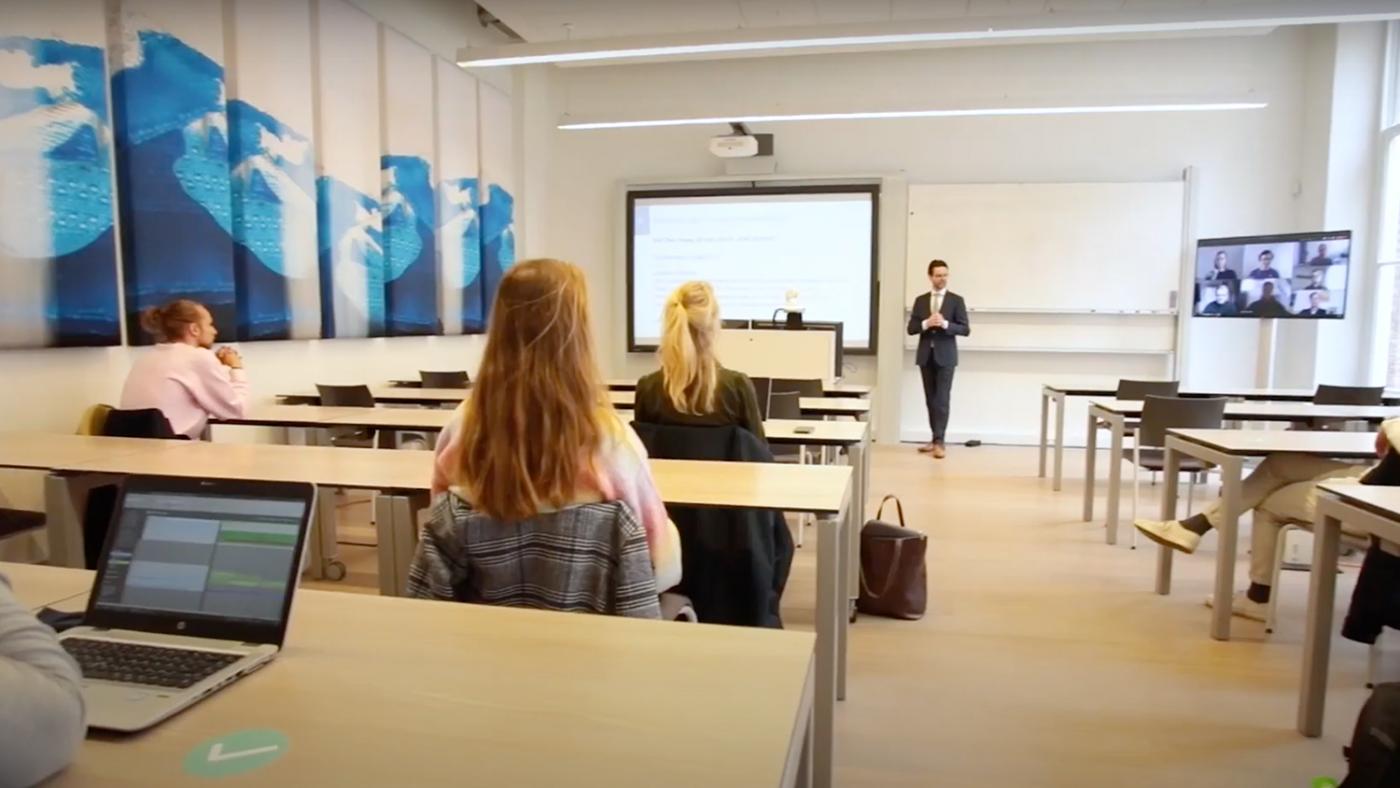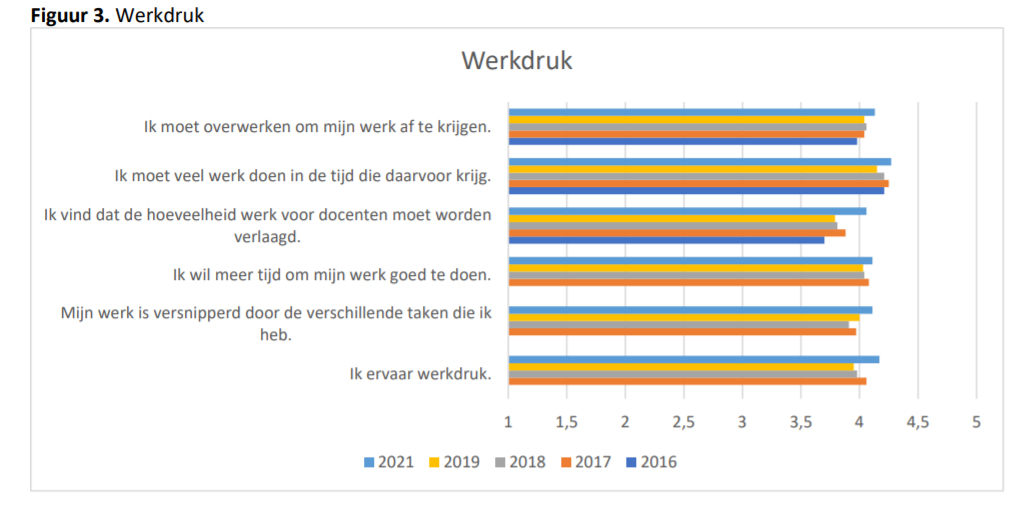Teachers felt the most swamped during block 1; students were better off

The increased work pressure among UU teachers has come forward in a new evaluation (available to those with a Solis ID) carried out by the Utrecht School of Science & Business Management (Dutch acronym: USBO) and the Centre for Academic Teaching. It was the fifth time since the beginning of the pandemic that UU teachers were surveyed about their experiences. Roughly four hundred respondents completed the short survey.
It looks like work pressure was significantly higher during the first block of the current academic year than in previous terms. Almost 75 percent of the respondents experienced high work pressure, and a similar amount said working overtime was a regular occurrence throughout block 1. One of the highlights of the survey is the increase in the number of teachers who agree with the statement that they should be given less work. Scholars working at the Faculty of Humanities have indicated through multiple statements that the situation is unacceptable. Graph taken from the Teacher Evaluation Survey regarding Block 1, academic year 2021-2022
Graph taken from the Teacher Evaluation Survey regarding Block 1, academic year 2021-2022
The results can be partly attributed to the specific circumstances of the first term. Classes on location were allowed again after a long time, albeit with a limit of 75 students per lecture hall. This restriction meant that teachers were often required to provide a hybrid form of education to ensure that part of the students could follow the same classes online. At the same time, the contamination rate rose, generating a heated debate around the efficacy of face masks and the possibility to adopt the Covid pass at higher education institutions.
Class in the Faculty of Law, held in 2021. Photo: DUB
Not safe
One in five teachers indicated that they didn’t feel safe when meeting students in person. They wish the university had provided them with clearer, uniform guidelines concerning the behaviour of students in the lecture halls. However, around 65 per cent of the respondents said they felt completely safe.
Additionally, there were many practical problems related to hybrid education. Making sure that everything was up and running was a significant source of pressure for some teachers, particularly those who only gave hybrid lectures incidentally. Teachers say they wish there was more support staff to whom they could quickly turn in case of questions or issues. To a considerable number of respondents, the university should have organised things better.
In the survey, teachers also indicated that it costs time and energy to change the way their classes are offered, as well as to master IT innovations. As a result, many found themselves working overtime, and they think they should be financially compensated for those extra hours.
On the other hand, plenty of teachers also expressed their appreciation for the way UU supported them with hybrid education, and there is a great demand to make more rooms suitable for this form of teaching.
Students felt much better
For students, this academic year started on a high note. The main thing about that block for them was "going back to the university". However, there were significant differences in the extent to which students were given classes on location during block 1. At UCU, almost all classes took place on location, while the Faculty of Social Sciences still held half of its classes online.
Based on the results of the fifth student evaluation since the start of the pandemic, of which 2,700 students took part, the return of face-to-face classes had a positive effect on students' wellbeing and their assessment of UU's education.
On a scale of five, the satisfaction rate regarding UU's education rose to 3.5 in the first block of the present academic year, up from 3.1 in the fourth block of 2020-2021. That's because, at the end of the previous academic year, there were fewer possibilities for classes on campus, leading the university to prioritise the freshmen. Consequently, students graded the state of their mental health a 6.1. That rose to 6.4. in the first block of 2021-2022.
Moreover, the study shows that students were less worried about not seeing classmates and teachers face to face. Moreover, a lot of students pointed out that, thanks to the classes on location, their motivation and ability to concentrate improved.
Similarly to previous evaluations, students in the first stages of their programmes often responded more positively to the questions, compared to students who remember what academic education was like before the pandemic.
“It was such a breath of fresh air to study on campus again, it was great. It really boosted morale and mental health, in my opinion. I'm scared we'll have to go back to a fully online education"
“Seeing my fellow students and teachers in person, and being able to share my feelings and thoughts with them, was a boost for my motivation and mental health.”
“Nice that more activities can be done on location, and even nicer that everyone is being taken into account (for example, through hybrid sessions and understanding for students who prefer not to be taught on location)"
Second-year students
Despite the boost provided by the possibility to attend classes in person, the study shows there still is a need for support from the university with regards to mental health and how to structure one's studies. Students seem to be more satisfied with UU's offer, but many still have no clue where to turn for help with certain problems.
Second-year students are of concern, as they joined the university amidst the coronavirus restrictions, therefore missing a real introduction. After a brief moment of relief in block 1, higher education went completely online again in December 2021 because of the second lockdown. As a result, students hardly had any social life and, to make things worse, an evening curfew was established in January. In questions specifically aimed at them, second-year students say they lamented the fact that they had missed those first introductions and get-togethers.
A behavioural biology class, offered in person. Photo: DUB
Health concerns
A striking revelation is that students were more concerned about their physical health during block 1 than in previous surveys. This may also be explained by the specific situation they were going through back then: the university reopened its doors, but the contamination rates kept rising and many students were forced to quarantine more than once. That's why there was an increased demand for online or hybrid classes.
But that was by no means an option everywhere, as this quote from the study shows: “The university lacks hybrid learning options for people who do not live in Utrecht and have to travel by train in the middle of a pandemic that's getting worse and worse. The university also shows poor understanding when someone has Covid.”
Finally, many students struggled with an increased workload and the pressure to perform deriving from the return of face-to-face classes. A student wrote: “I see that UU is working really hard to offer everyone what they missed when the pandemic broke out. However, it's a shame that all the good lessons learned in that time about rest and work pressure have gone right out the window, only to get things 100 percent back to normal.”